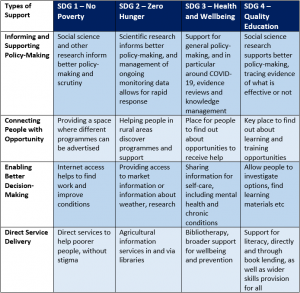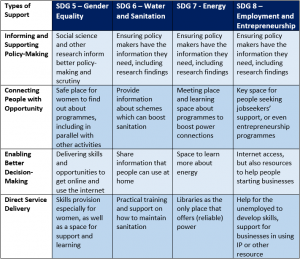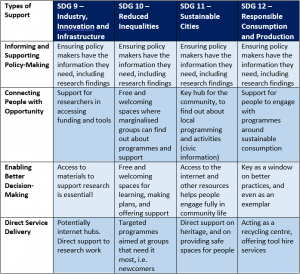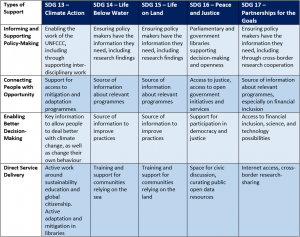Today marks the beginning of SDG Action Week, a celebration of the work currently taking place to deliver on the Global Goals, and an opportunity to reflect on what more needs to be done.
Clearly, with the consequences of the COVID-19 Pandemic, reaching the Sustainable Development Goals seems as challenging as ever, as highlighted in the Gates Foundation’s Goalkeepers report earlier this week.
The Week will see great ideas being shared on how to ensure an effective response to the pandemic now, and a rapid and equitable recovery afterwards. We have already encouraged libraries to take part in the events, and share their own ideas.
Of course, it’s not just during SDG Action Week that it’s important to share these ideas! Governments are taking decisions related to sustainable development all the time.
In order to ensure that libraries are fully recognised and integrated into policy planning, it is important to have examples and ideas to hand
IFLA already makes two great resources available for this. First of all, the SDG Stories on IFLA’s Library Map of the World provide a growing set of examples. Those who have shared examples there not only help colleagues in their advocacy, but receive profile for their own work.
Secondly, we have a collection of national awareness raising materials, produced by library associations and groups of libraries, illustrating how our institutions are contributing to achieving the SDGs.
It can help to prepare your own list of such stories. This doesn’t need to be formally presented (although of course, it can be powerful if you do!), but even having it ready when preparing meetings, news stories or other events can be useful?
How to go about this?
Sometimes, contributions are clear. Libraries have an obvious and traditional role in supporting literacy (SDG4), connectivity (SDG9 and SDG17), and the safeguarding of heritage (SDG11). There are already lots of great examples on the Library Map of the World about these.
But of course libraries contribute across the board.
In order to help you think about your library, or libraries in your country, here are four ways which – in the case of each of the SDGs – libraries are contributing:
1) How are libraries informing and supporting policy-making? For example, in all of the policy areas across the SDGs, libraries are likely to be supporting research and other efforts to build understanding of the world around us. Within governments, they are helping deliver evidence-based policy making, while those in parliaments are helping legislatures holding those in power to account.
2) How are libraries connecting people with opportunities? Public efforts to support development are often only as effective as the communication about them. Work to promote knowledge of, and access to public benefits, programmes or services can make a real difference, for example through internet access, noticeboards or proactive advice and support for users. This is particular the case for users who are unconnected at home, or unwilling to visit official buildings.
3) How are libraries enabling better decision-making at the individual level? Of course, not all support comes from government sources! For people to make decisions about their own lives and work, there are plenty of other places to find information, both in library collections and on websites accessible at (or thanks to) libraries. Librarians of course do help people develop the skills and confidence to make full use of this information to improve their lives.
4) How are libraries delivering services directly? As highlighted, libraries are involved in directly providing services such as literacy, internet access, access to research or preservation and conservation. Increasingly, there are also programmes supporting other SDGs. But it’s not just about what librarians themselves do! Libraries can also be platforms and facilitators, helping others to deliver programmes that help make change happen – and indeed, this can be a great way of increasing impact!
Below, we set out a grid sharing some ideas for first answers to each of these questions, for each of the SDGs.




If you are trying to put together your own database of examples to use in your advocacy, we hope these help you to identify where to look! And of course, once you have found your examples, you can use our SDG Storytelling Manual to develop them into full stories!